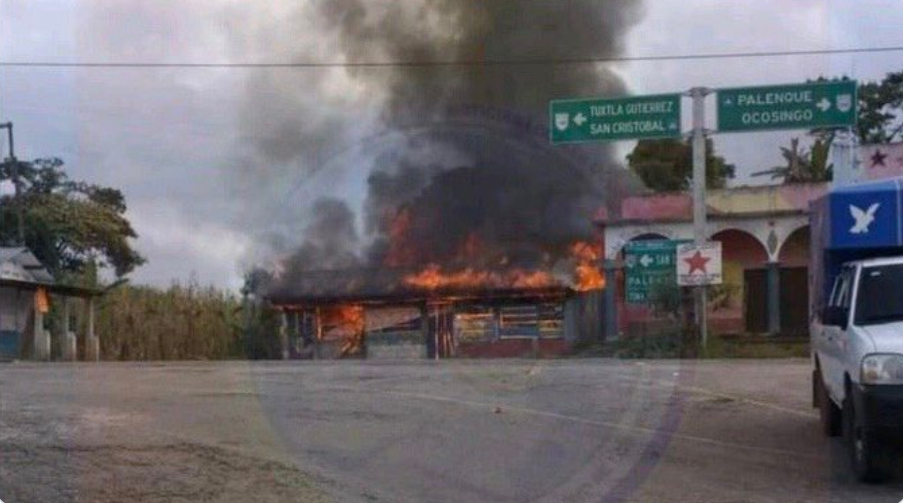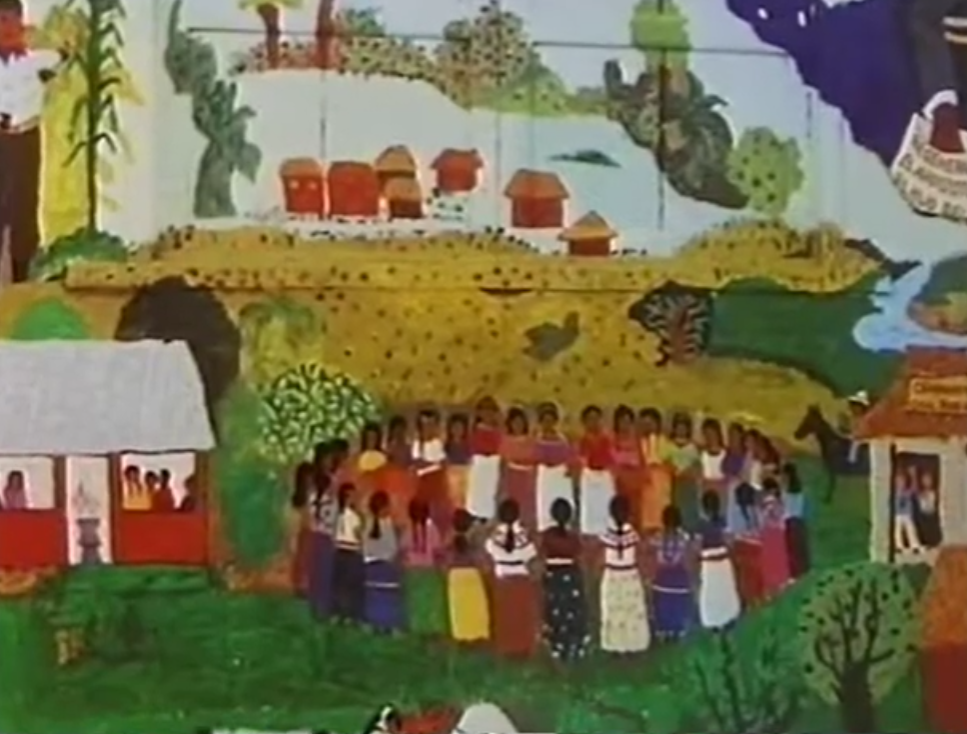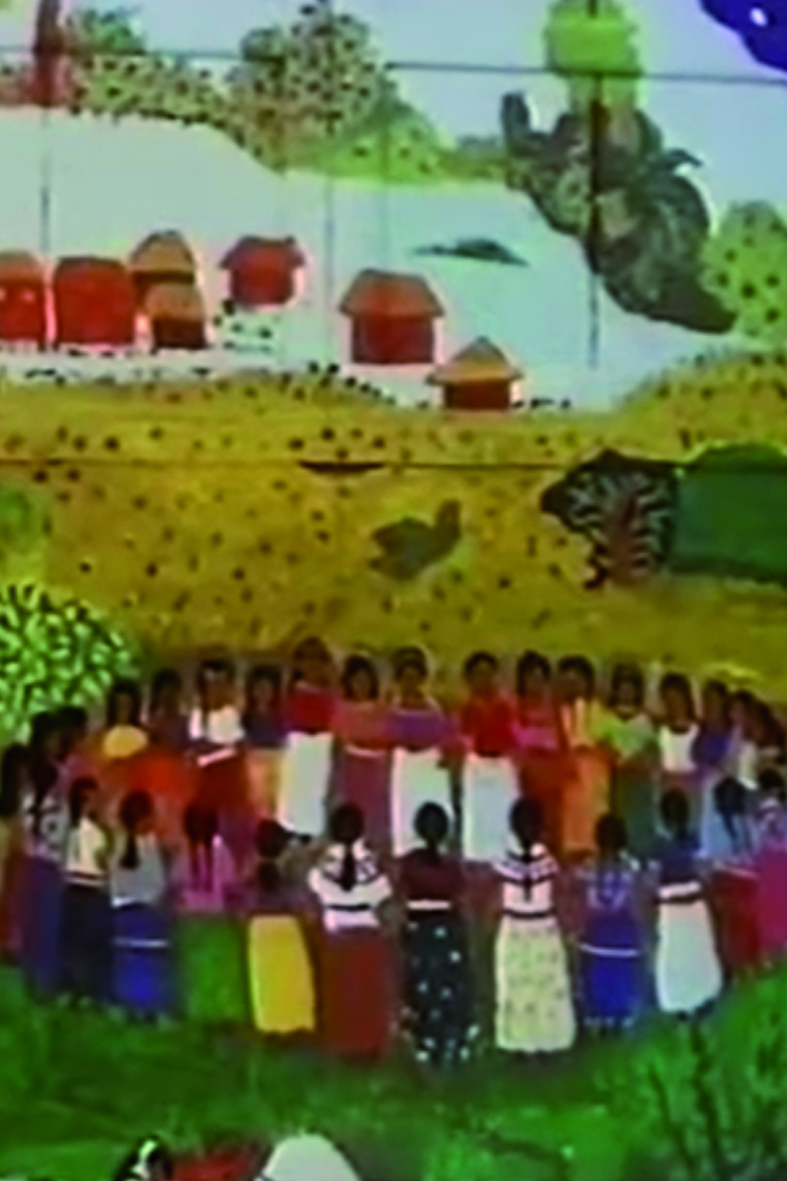Just this past September 11th, two Zapatista authorities of the Junta de Buen Gobierno, the Good Government Council of Patria Nueva of Caracol 10 (Ocosingo), José Antonio Sánchez Juárez and Sebastián Núñez Perez, were kidnapped. They disappeared for 8 days. They also were robbed of their communication radio and 6 thousand pesos in cash.
It was no minor incident. The provocation was evident. That day, La Extemporánea, the Zapatista airborne delegation of 177 people of Mayan descent was in Mexico City, to embark on its expedition to Europe.
The kidnapping was perpetrated by the Regional Organization of Coffee Growers of Ocosingo (ORCAO), a paramilitary organization responsible for numerous aggressions against the Zapatista support bases in the last 20 years.

The first of these took place the 28th of October of 2001, when members of the group arrived in the community of Cuxuljá to paint over the mural of the Nuevo Amanecer del Arco Iris (New Dawn of the Rainbow) trading center created by several autonomous municipalities in rebellion, set it on fire, and threatened and beat those who were there. Since then, and under different pretexts, the aggressions against the rebel support bases has not ceased.
Cuxuljá means “living water” in the Tseltal language. It makes up part of the municipality of Ocosingo. Some 500 people live there. For them the water is sacred. It used to be called Pozo el Encanto (Enchanted Well). The well is part of the identity of its inhabitants (https://bit.ly/2WhONlG).
In December of 2000, the EZLN demanded of the government of Vincente Fox three signs in order to renew the peace dialogues: compliance with the Accords of San Andrés1, liberation of the Zapatista political prisoners, and the withdrawal of troops and closure of seven Army posts, of the 259 that it had in the conflict zone at the time.
One of those sites was Cuxuljá, on the highway which connects San Cristóbal and Ocosingo. The military presence in the community was not incidental. The town is part of a corridor of great geopolitical relevance. It is a key communication point for eight autonomous municipalities and a complex social network. So, when the soldiers abandoned it, the government replaced them with a counterinsurgency with a civilian and indigenous face — the ORCAO.
At that same time, according to the warnings of three autonomous municipalities in October 2001, the Army admitted three members of the community who, armed and in uniform, tried to kill the children of Zapatista authorities, and gave out marijuana seeds for planting. “To this denunciation –they pointed out— we add the hostilities from soldiers, and Public Safety and Federal Way officers against our new store that we are building in our place that belongs to us at the post that was vacated by the federal Army in Cuxuljá.”
ORCAO was formed in 1987, from the work of the Catholic church, with 12 communities of Sibacjá. It expanded with the invasions of estates close to Ocosingo, and in towns in the municipalities of Chilón, Oxchuc, Huixtán, y Altamirano. In part, it is a product of the Indigenous Congress in San Cristóbal in 1974 and of the mobilizations against the defunct Mexican Institute of Coffee (Inmecafé) for better prices for coffee, more collection centers and more supports, in which the Unión de Uniónes (Union of Unions) was formed. It fought also against agrarian backwardness and was opposed to the reforms of Constitutional Article 272. It participated in 1992 in the days of commemoration of 500 years of indigenous, black and popular resistance, and reclaimed indigenous self-determination. At one time, it joined the Emiliano Zapata National Indigenous Campesino Alliance (ANCIEZ). It was, until its expulsion in 2015, a member of UNORCA3 (https://bit.ly/3goUvWS).

The municipality of Ocosingo was incorporated in 1921. It is the largest in Chiapas. In July of 1999, as part of the counterinsurgency policy of Croquetas, Roberto Albores Guillén, was broken up to make two new municipalities — Marqués de Comillas and Benemérito de las Americas.
The state, and especially its jungle regions, was militarized. So much so, that Juan Vázquez, one of the leaders of the ORCAO, now dedicated to business, before being co-opted by the government, denounced that Chipas was dressed in green… because of the number of soldiers deployed there. In spite of this, on December 19th, 1994, the EZLN broke the military siege and established 38 autonomous municipalities in rebellion, nine in Ocosingo.
On April 11th of 1998, when the federal and state government launched a violent military-police operative in Taniperlas against the autonomous municipality Ricardo Flores Magón, one of the objectives of which was to destroy a beautiful mural that has been replicated in hundreds of different countries, ORCAO let it happen.
Equipped with a military structure, weapons and uniforms the association promptly forgot its origins and transformed itself into a paramilitary style force against Zapatismo. Its leaders became municipal, state and federal officials during the governments of Pablo Salazar and Juan Sabines. Juan Vázquez was first named Secretary of Rural Development and later Secretary for Reconciliation, and Nicolás López (now dead), director of the Coordinating Center of the National Indigenist Institute in Ocosingo. For more than two decades he has received millions in governmental resources for a multitude of projects, including cattle ranches, a motor for the parceling out of common land.
The political decomposition of the organization has gone hand in hand with the personal decline of its leaders. With the passage of time and various internal crises, leaders like José Sánchez and Tomás Santis Gómez, even more violent than those before them, and at the service of a variety of interests, took control of the association, which became fragmented. Its shock force adapts to the interests of the highest bidder. Their support of the Green Party in Ocosingo has paid considerable dividends.
In Chiapas, there is not a series of isolated intercommunity conflicts, but rather the crisis of a regional system of domination. ORCAO is one more piece of this system, one of its paramilitary arms. That crisis puts the state, as the Zapatistas warn, on the brink of civil war.■
Luís Hernández Navarro
This article was published in La Jornada on September 28th, 2021. https://www.jornada.com.mx/2021/09/28/opinion/020a1pol This English interpretation has been re-published by Schools for Chiapas. https://schoolsforchiapas.org/orcao-the-paramilitary-arm.

